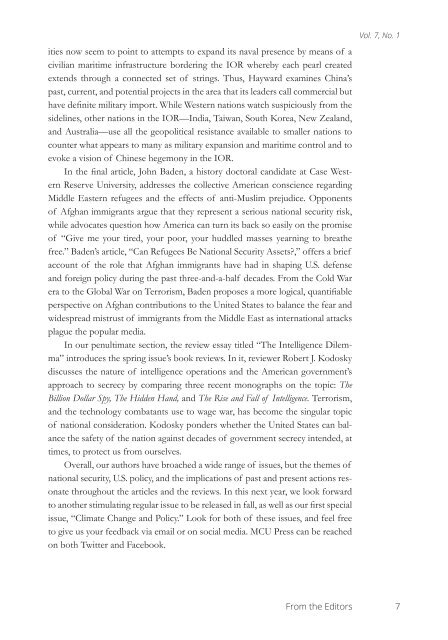Call for Submissions
1S7vIsW
1S7vIsW
Create successful ePaper yourself
Turn your PDF publications into a flip-book with our unique Google optimized e-Paper software.
ities now seem to point to attempts to expand its naval presence by means of a<br />
civilian maritime infrastructure bordering the IOR whereby each pearl created<br />
extends through a connected set of strings. Thus, Hayward examines China’s<br />
past, current, and potential projects in the area that its leaders call commercial but<br />
have definite military import. While Western nations watch suspiciously from the<br />
sidelines, other nations in the IOR—India, Taiwan, South Korea, New Zealand,<br />
and Australia—use all the geopolitical resistance available to smaller nations to<br />
counter what appears to many as military expansion and maritime control and to<br />
evoke a vision of Chinese hegemony in the IOR.<br />
In the final article, John Baden, a history doctoral candidate at Case Western<br />
Reserve University, addresses the collective American conscience regarding<br />
Middle Eastern refugees and the effects of anti-Muslim prejudice. Opponents<br />
of Afghan immigrants argue that they represent a serious national security risk,<br />
while advocates question how America can turn its back so easily on the promise<br />
of “Give me your tired, your poor, your huddled masses yearning to breathe<br />
free.” Baden’s article, “Can Refugees Be National Security Assets?, ” offers a brief<br />
account of the role that Afghan immigrants have had in shaping U.S. defense<br />
and <strong>for</strong>eign policy during the past three-and-a-half decades. From the Cold War<br />
era to the Global War on Terrorism, Baden proposes a more logical, quantifiable<br />
perspective on Afghan contributions to the United States to balance the fear and<br />
widespread mistrust of immigrants from the Middle East as international attacks<br />
plague the popular media.<br />
In our penultimate section, the review essay titled “The Intelligence Dilemma”<br />
introduces the spring issue’s book reviews. In it, reviewer Robert J. Kodosky<br />
discusses the nature of intelligence operations and the American government’s<br />
approach to secrecy by comparing three recent monographs on the topic: The<br />
Billion Dollar Spy, The Hidden Hand, and The Rise and Fall of Intelligence. Terrorism,<br />
and the technology combatants use to wage war, has become the singular topic<br />
of national consideration. Kodosky ponders whether the United States can balance<br />
the safety of the nation against decades of government secrecy intended, at<br />
times, to protect us from ourselves.<br />
Overall, our authors have broached a wide range of issues, but the themes of<br />
national security, U.S. policy, and the implications of past and present actions resonate<br />
throughout the articles and the reviews. In this next year, we look <strong>for</strong>ward<br />
to another stimulating regular issue to be released in fall, as well as our first special<br />
issue, “Climate Change and Policy.” Look <strong>for</strong> both of these issues, and feel free<br />
to give us your feedback via email or on social media. MCU Press can be reached<br />
on both Twitter and Facebook.<br />
Vol. 7, No. 1<br />
From the Editors<br />
7


